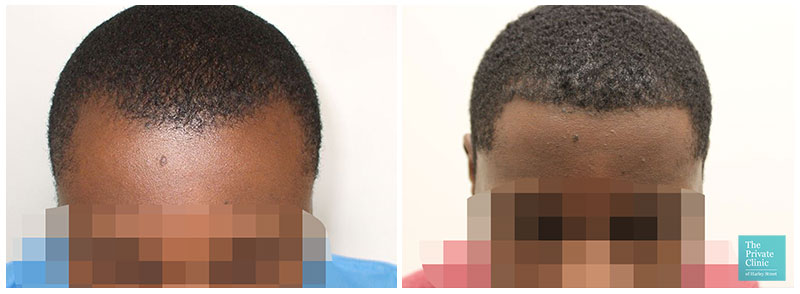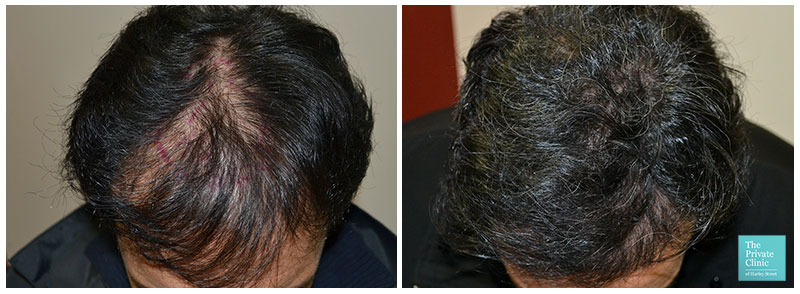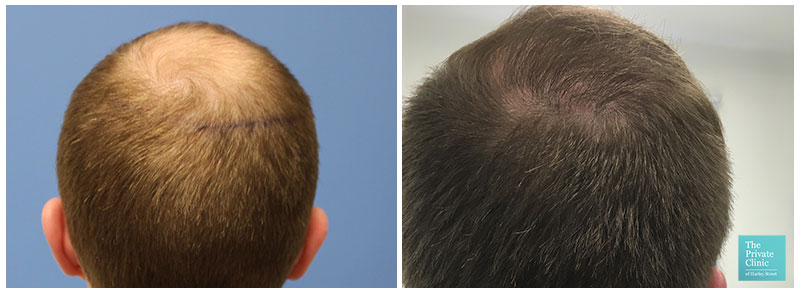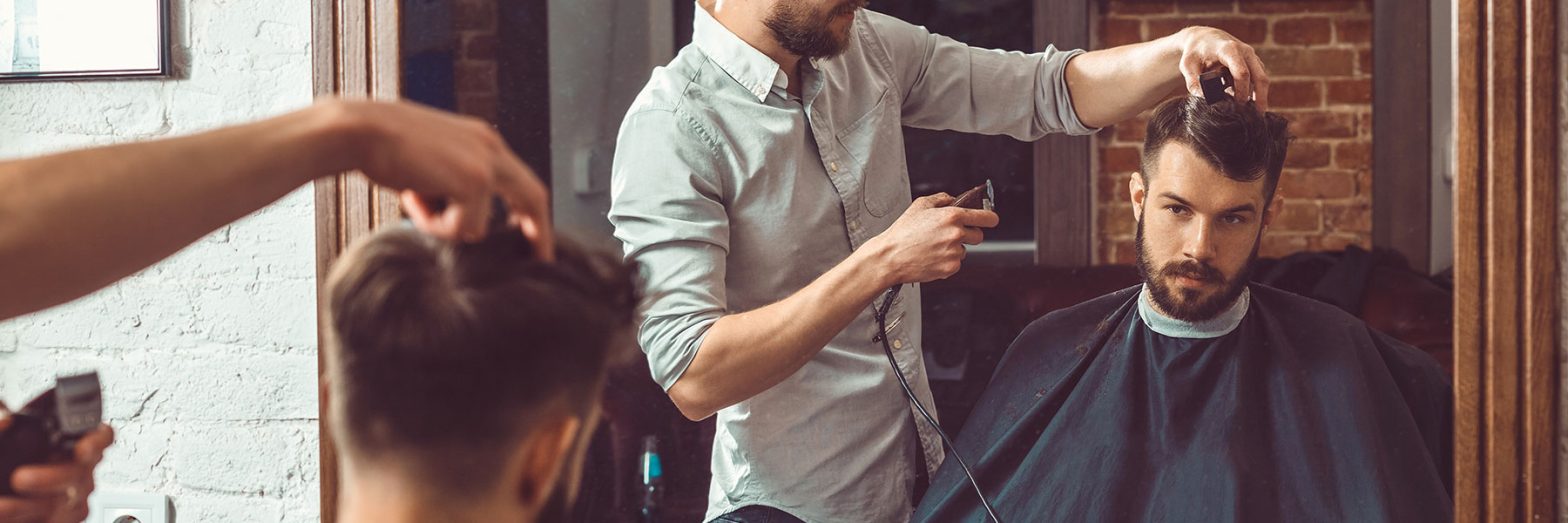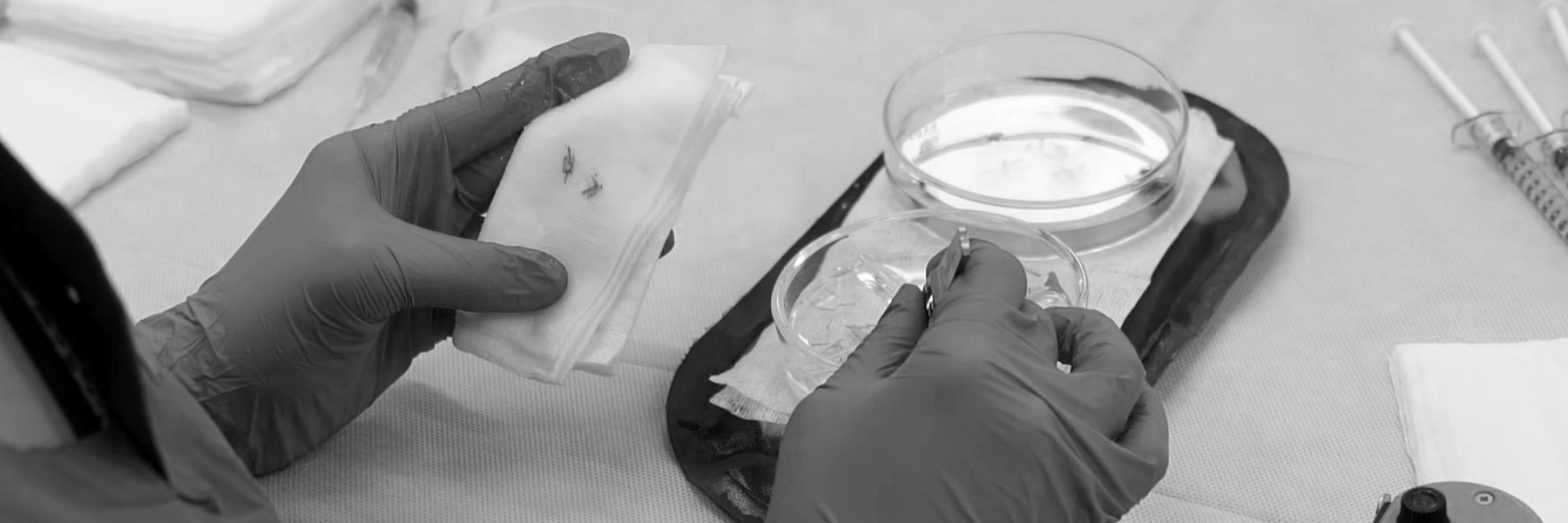
The Top 10 Things You Should Know about Hair Transplants
Your Confidence. Your Social Life. Your Hair. Let us help restore them!
Hair Transplants can be a great way to boost you confidence and help you look and feel better for your age but Hair Transplants can also be done badly. This is something we want people to know how to avoid.
We have put together 10 things you should know before having a hair transplant and why you should choose The Private Clinic for your FUE Hair Transplant.
1. FUE vs. FUT – The Two Most Popular Procedures
There are two main types of hair transplant procedures that clinics tend to offer – FUE (Follicular Unit Extraction) and FUT (Follicular Unit Transplantation a.k.a the ‘Strip’ method).
The FUT method is older and involves cutting and removing a strip of skin and hair on your scalp. From there it is divided up and transplanted into the balding or thinning areas. It leaves a scar at the donor site, which can be covered by hair, and requires a lengthy aftercare schedule.
The FUE Hair Transplant method utilises the advances made in the field and makes small incisions around each hair follicle unit, which is then prepared and transplanted to the balding or thinning area. There is little downtime and aftercare required but it takes longer than the FUT method – something that raises the cost.
Our experienced hair transplant team specialise in the latest minimally invasive procedures, which is why we do not perform the older FUT method.
The benefits of an FUE Hair Transplant include:
- Quicker recovery time
- Less pain post-surgery
- Minimal scarring
- More natural looking results
- Hair can be styled in any way post-hair transplant
Find out more about FUT vs FUE Hair Transplants here.
2. Ethnicity – Skin & Hair Type
In order to achieve the best results possible and reduce scarring, with maximum success, you need a Hair Transplant Surgeon that knows how to care for your skin and hair type. Choosing a surgeon who can show experience with working with Asian, black or ethnic hair is highly recommended to ensure that you are in the best possible hands for your hair transplant procedure.
Our Hair Transplant Surgeons regularly help patients of all skin and hair types achieve the results they wanted.
3. Cost
Don’t make your decision on who to choose for a hair transplant based on costs of procedure. We understand that the cost of treatment is going to be a big part of your decision making process but it is so important to also look at success rates. Good quality hair transplant results take time and money.
30% of Hair Loss patients that come to us have been somewhere before for a Hair Transplant procedure and now need further work to improve on a disappointing result. What might seem like a money-saver now might cost you a lot more later on correcting or redoing a procedure. We know that travelling abroad for a cheaper hair transplant procedure can seem idyllic but we do recommend thinking carefully about your procedure and understanding what risks can be involved with doing this.
See our blog on travelling abroad for a hair transplant procedure here:
4. Experience
Make sure your clinic and hair transplant surgeon has lots of professional experience performing hair transplants – particularly with your skin and hair type.
- Ask to see before and after pictures.
- Ask how often they perform procedures.
- Ask about their experience and qualifications.
- Look at reviews or ask to hear from previous patients
- Ask about their aftercare policy
5. Risks and Complications
During your consultation your hair transplant surgeon should discuss the risks and complications that can occur in relation to a hair transplant procedure. They should cover;
- What risks are involved
- What complications can occur
- What they do to ensure that they minimise the risk
- What will happen to you if there is a complication
The surgeons are not trying to scare you, or put you off but they are just allowing you to make a well informed decision. Put yourself in a safe position by asking questions and opting for a clinic that puts patient care first. Unfortunately cut-price clinics may not offer the standards of care that will afford you the results you want or the care necessary when undergoing such a procedure.
6. Social Media & the Internet
Social media and (more generally) the internet have transformed how we access information and interact with each other. Check out the online reputation for clinics, doctors and surgeons. Bear in mind, not everyone who has a hair transplant wants to talk about their procedure online. It is only one measure when gauging reputation, and not everything you read online is true and the best way to find out more about a clinic is to attend a consultation where you can see the clinic, meet the surgeon and ask any questions you may have.
7. Preparations and Aftercare
There will be a number of things you will need to avoid in the run-up to your hair transplant, during it and soon after. This time frame is extended for the older FUT method, as a rigorous aftercare schedule is necessary. Luckily the FUE method requires little downtime and aftercare, helping you to get back to your normal life as quickly as possible.
Typical things you can expect to have to avoid for the initial days following a hair transplant include:
- Alcohol
- Smoking
- Exercise (anything involving excessive sweating)
- Spicy foods
- Sleeping on your back
- Washing your hair
8. Take Your Time
Unless you have an event or time frame in mind, it is always advisable to take your time. A good clinic will not pressure you to sign anything until you are ready. There are usually patient advisers at hand to help you with any questions you might have so please do use them. Do lots of research and avoid making any big decision soon after a dramatic change in your life to ensure you are going ahead for the right reasons.
9. Hair Loss Medication
There are two approved hair loss medications – Minoxidil (brand names include Regaine) and Finasteride (brand names include Propecia). It is advisable to speak to your surgeon about using medication to help before and after your Hair Transplant in order to help halt any further thinning or hair loss.
10. The Private Clinic – leaders in treating Hair Loss & FUE Hair Transplants
We promise this is a valid point! Here at The Private Clinic we have four experienced and qualified Hair Transplant Surgeons, working from our clinics.
The Private Clinic prides itself on ensuring you have the best quality and most comprehensive care:
- You will be treated by highly experienced Hair Transplant surgeons who are specialised in FUE (Follicular Unit Extraction) and treat hundreds of patients every year.
- FUE is a minimally invasive treatment (meaning there is no cutting of a strip), and carried out under local anaesthetic – many patients either watch TV, or even fall asleep during the procedure.
- You won’t require any stitches after your treatment. This means that the recovery time is also reduced when compared to the Strip surgery (FUT). Find out more about FUE Hair Transplant Recovery here.
- We use the finest instruments, resulting in as minimal trauma to your scalp as possible.
- Thanks to our advanced skills and techniques, our team ensure that the donor area looks intact after the hair transplant procedure and you can keep your hair really short if you prefer without any obvious scarring.
- We choose the best follicular unit (a group of hairs); this ensures that only the strongest, healthiest grafts are used for your hair transplant procedure.
- Your results will look natural, with denser packing – the hair is implanted in the direction that matches your hair growth, and because we select healthy follicular units, the treated area will look densely filled.
- Our surgeons offer the Unshaven Hair Transplant (U-FUE) (the long-hair hair transplant), to those who prefer not to shave beforehand. At your consultation, we will be able to advise you on whether an unshaven procedure is suitable for you.
- Scars resulting from injuries or previous surgeries can also be corrected. This could be a previous bad hair transplant or we can cover linear scars caused from FUT hair transplants.
- The Private Clinic has a network of UK clinics and has been established for 35 years with a strong reputation for quality care with a Trust Pilot 5 star rating.
- Find out more information in our blogs
- See our hair transplant before and after photos here
- Read our extensive FUE Hair Transplant FAQs here
- See our Hair Transplant videos here
- Read our hair transplant patient stories here or watch videos here
Expert Hair Transplant Surgeons at The Private Clinic
- Dr Furqan Raja, MB ChB, GMC Number: 7419667
- Mr Michael Mouzakis S.C.F in Plastic Surgery, GMC Number: 7237640
- Dr Luca De Fazio MD, BSc, MSc, GMC Number: 7095123
- Dr Ismail Ughratdar, MB ChB, GMC Number: 6103427
Hair Transplant consultations are available at our clinics in London Harley Street, Birmingham, Leeds, Manchester and Northampton.
To find out more about FUE Hair Transplants call 0333 920 2471 or use our hair transplant online contact form



